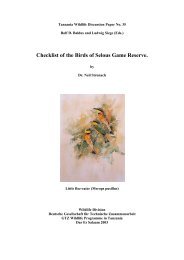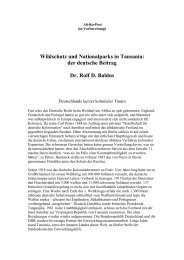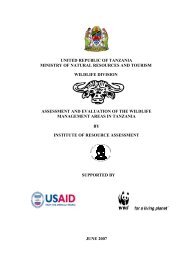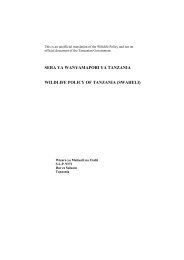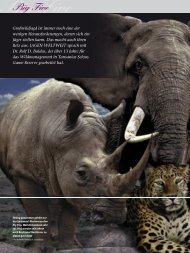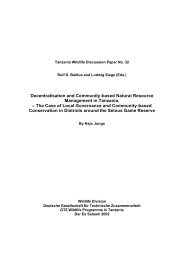African Indaba Articles - wildlife-baldus.com
African Indaba Articles - wildlife-baldus.com
African Indaba Articles - wildlife-baldus.com
Create successful ePaper yourself
Turn your PDF publications into a flip-book with our unique Google optimized e-Paper software.
I know about hunting too. As a warden assigned to game control and then a contractor undertaking largescaleculling across East Africa, I have probably hunted more than most. I appreciate that little of this was formy personal enjoyment and, while on occasion the activity was unquestionably exciting, my over-ridingemotional state was little different to that when, as a beef producer, I slaughter a steer. Done of necessity,there is no pleasure in the act.Don’t get me wrong … I do enjoy light bird shooting, though again, satisfaction in pulling off a difficult shotnotwithstanding, there is no pleasure in actual killing. Similarly, I fish and, in my mind fishing is a form ofhunting. In both bird shooting and fishing I only take quarry that I enjoy eating. Pleasure from both activitiesarises from the environments where they take place and, overwhelmingly, from the <strong>com</strong>pany in which theyare undertaken. An evening stroll out of camp with a couple of <strong>com</strong>panions, to return with a brace or two offrancolin or guineafowl, or a quiet evening’s casting over forest pools and landing a three-quarter poundtrout, are experiences to be treasured.Others might want more ‘body’ to their hunting and, relishing a quotient of adrenalin and danger, wantlarger quarry. With that I have no quarrel. I certainly understand that the difference between me taking acouple guineafowl and someone else stalking a bushbuck – or a buffalo for that matter - is slight and relative.The satisfactions derived are personal. Hunting, as I <strong>com</strong>prehend it, is a private undertaking both in the<strong>com</strong>pulsions that lead to it and in its rewards. One way or another, it is not a ‘spectator sport’ – which is whyfilms about hunting fall so short of the mark and do more damage than good to the hunter’s reputation.The philosophical arguments for and against hunting are ancient, interminable and largely pointless.Hunting may be cruel, it may be atavistic, it may satiate drives that aesthetes preferred didn’t exist: I’ll notdispute the charges (though this is no concession to verity or otherwise). What surely counts is thatthroughout civilization’s history, wild animals have been conserved so that they can be hunted. Whatever theflaws in pro-hunting arguments, that fact is indisputable.The most <strong>com</strong>mon and widespread reason resulting in successful conservation across time and cultures,has been to sustain hunting. Other reasons have been successful locally – but none as generally effective asthe measures taken to provide hunters with quarry. In view of this success, it is profoundly stupid to turnagainst it. That, for me, is the strongest case for hunting.Yet the manner in which hunting in Africa is widely conducted contradicts its own supporters’ claims of itbeing a sport. It is the hunters who say that they get no enjoyment from the actual act of killing, and that thesport lies in outwitting wary quarry through skill, cunning and physical endeavor.When animals are shot from vehicles – and let’s face it, many are – then the only enjoyment has to be theact of killing, for driving up to them in vehicles calls for no skill or physical endeavor. When animals arereared as domesticants then taken into the bush to be shot, that, too, undermines the hunters’ stated cases.As I have written in these pages before, hunting big dangerous animals is, like mountaineering, a fit man’ssport. Elderly, over-weight, unfit people who, at best, can only waddle short distances cannot hunt. They areno doubt the reason why so many animals in Africa are shot from vehicles.In similar vein, the obsession with trophy quality seems to override what hunters claim is the rationale forhunting. There was a time when hunting involved endurance, tracking, getting up to potential quarry, thenturning it down, possibly going home with nothing, because the trophies did not <strong>com</strong>e up to the hunter’sstandard. Even those opposed to hunting acknowledged the endeavor and admired it.The reward for that sort of hunting was intensely personal: as I said earlier, hunting is not a spectatorsport. Yet the extra inch of horn that is now such a <strong>com</strong>petitive element – particularly in America – is difficultto divorce from public display.I am well aware of all the economic arguments that favor the short cuts and the ‘tupa nyuma’ style ofhunting so prevalent today. Safari hunting is a business, the customer is always right and has to be satisfied.All these factors shape what is happening in Africa. It is disturbing, however, that so few hunters areaddressing the fundamental issues and tackling them head-on.My point: I believe that hunting can produce effective conservation and that this is a powerful argument inits favor. Yet hunters shoot themselves in the foot when they fail to abide by the ‘ethics’ and argumentsthrough which they justify themselves. If, in the end, hunting loses ground in Africa, then this failure will havecontributed in large measure to that loss.131



